Posts Tagged literary fiction
BEST BOOKS OF 2020
Posted by Amy Steele in Books on January 4, 2021
I read 87 books this year– 84 by women; three by men; 32 by BIPOC authors. The shortest book I read was Intimations by Zadie Smith. The longest book I read was Goldfinch by Donna Tartt. Here are the best books (5/5*) that were published in 2020 that I read.
Intimations by Zadie Smith
Penguin Books, July 2020. 97 pg.
A slim collection of essays–about aging, community, race, COVID 19, writing– that Zadie Smith wrote during the pandemic. There’s much to consider within these pages of thoughtful, personal and universal essays. She explains: “Talking to yourself can be useful. And writing means being overheard.”
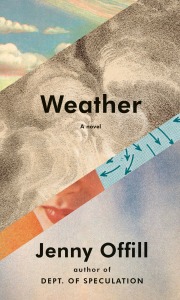 Weather by Jenny Offill
Weather by Jenny Offill
Knopf, February 2020. 207 pg.
fantastic, creative and timely novel addressing the current climate crisis and the impending apocalypse. it’s from the point-of-view of a middle-aged woman –so definitely relatable to me (I want to read more novels about older women). She’s married and has a son. Her brother is a recovering drug addict and she’s had to care for him throughout the years. Jenny Offill excels at this observational narrative. It’s short, riveting, potent. It’s really the perfect thing to read during this COVID-19 pandemic and quarantine we’re all experiencing. Plus it’s quite relatable to middle-aged spinster GenX me: “The woman has just turned fifty. She tells me about her blurriness, the way she is hardly seen. She supposes she is not so pretty anymore–fattish, hair a bit gray. What she has noticed, what gives her a little chill, she tells me, is how if she meets a man out of the context of work, he finds her to not be worth much. He looks over her shoulder as he talks or pawns her off on a woman her own age.”
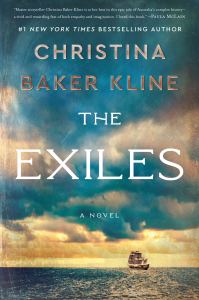 The Exiles by Christina Baker Kline
The Exiles by Christina Baker Kline
Custom House, August 2020. 370 pg.
I loved this amazing work of historical fiction so much and don’t know why I waited so long to write about it! It covers an intriguing aspect of history that I’ve not read much about. Based on actual events, the novel focuses on a ship of female convicts traveling from England to Van Diemen’s Land (Tasmania) in the 1850s. Although Aboriginal people have occupied Australia for thousands of years, the British government views the native people as nuisances and the land to be uninhabited and available for their use. It’s amazing to think about some of the low level crimes for which many were sentenced as well as the harrowing passage. “Evangeline recalled seeing small items in the newspaper over the years about the incorrigibles– men, she thought– transported on convict ships to Australia. Murderers and other deviants exiled to the far side of the earth, ridding the British Isles of the worst of its criminals.” Evangeline is a governess accused of stealing a ring which had been given to her by the family’s older son with whom she’d become romantically involved. She’s well-educated and her late father was a minister. The other staff members didn’t like her. “She was, by temperament, much like her father: diffident, with a shyness often mistaken for aloofness, a bookishness perceived as snobbery.” She’s sentenced to 14 years in prison. She’s pregnant and gives birth to a daughter onboard. Sadly she’s thrown overboard by a crew member who she’d stabbed to protect Hazel, who he’d been sexually assaulting. Hazel is a scrappy convict whose midwife mother taught her many potions and remedies. Mathinna is a native woman who knows how to read and learns to speak French. She’s taken from her tribe by Van Diemen’s governor’s wife on a whim. She considers her a project. It doesn’t work out well. The novel’s a complete page turner and I became so invested in these women I didn’t want it to end.
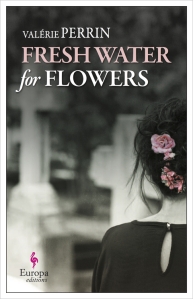 Fresh Water for Flowers by Valerie Perrin
Fresh Water for Flowers by Valerie Perrin
Europa, June 2020. 476 pg.
“My closest neighbors don’t quake in their boots. They have no worries, don’t fall in love, don’t bite their nails, don’t believe in chance, make no promises, or noise, don’t have social security, don’t cry, don’t search for their keys, their glasses, the remote control, their children, happiness.”
I walk in cemeteries fairly often. There’s one in my neighborhood. When I was in grad school, I would drive to the Arlington National Cemetery to take walks through it. I liked the quiet and solitude. I sometimes wonder about the people whose names I see on gravestones. Violette Toussaint is a cemetery caretaker in the small French town Bourgogne. She lives on site. She takes notes on everyone who’s buried there. She’s close friends with three gravediggers, three groundskeepers and a priest. She feeds the stray cats that roam the cemetery. She reads. She bakes. It sounded fairly idyllic to me. I love the writing and this character. Violette is different, interesting, smart, thoughtful. I found myself deeply connected to her– “I don’t fit into boxes. I’ve never fit into boxes. When I do a test in a women’s magazine– “Get to know yourself,” or “Know yourself better”–there’s no clear result for me. I’m always a bit of everything.” I don’t fit in boxes either.
“I’m not after a love story. I’m too old for that. I’ve missed the boat. My meager love life is an old pair of socks shoved to the back of the closet.”
Julian Sole, a police detective, arrives one day and tells Violette that his mother wanted her ashes spread on someone’s grave who wasn’t her husband. He wants to know why. Violette reflects on her own husband who had numerous affairs and left her. She recalls: “He turned our bed into a paradise, was considerate and sensual when making love, but as soon as he got up, was vertical, left our horizontal love behind, he lost a good deal of color. He had nothing to say, and was interested only in his motorbike and video games.” Violette’s mother abandoned her and she was pregnant at 18. Drawn to each other, Violette and Julian spend more time together as they help reconcile the past. There are more secrets of the dead and the past revealed but I can’t give too much away or I’d ruin it. The novel unwinds with several twists. It’s smart, funny and dark. Just what I like. It’s a full reflection on life and death and everything involved.
Julian Sole, a police detective, arrives one day and tells Violette that his mother wanted her ashes spread on someone’s grave who wasn’t her husband. He wants to know why. Violette reflects on her own husband who had numerous affairs and left her. She recalls: “He turned our bed into a paradise, was considerate and sensual when making love, but as soon as he got up, was vertical, left our horizontal love behind, he lost a good deal of color. He had nothing to say, and was interested only in his motorbike and video games.” Violette’s mother abandoned her and she was pregnant at 18. There are more secrets of the dead and the past revealed but I can’t give too much away or I’d ruin it. The novel unwinds with several twists. It’s smart, funny and dark. Just what I like. It’s a full reflection on life and death and everything involved.
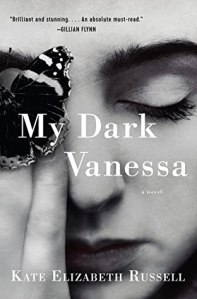 My Dark Vanessa by Kate Elizabeth Russell
My Dark Vanessa by Kate Elizabeth Russell
William Morrow, March 2020. 373 pg.
A 42-year-old English teacher at a prep school in Maine grooms then rapes his 15-year-old student. Although it’s a story that ‘s been told numerous times, it’s a remarkably strong perspective that’s completely engrossing. The story alternates between 2000 and 2017 where adult Vanessa finds herself finally recognizing the level of abuse and how it’s affected her. I have a memory from high school of being in gym class and one of my classmates going up to a (very attractive) teacher and unbuttoning a button on his shirt and commenting something about the full buttoned up style. It was so bold. That was how this popular student commanded attention. I didn’t even kiss a boy until college. Vanessa is incredibly naïve as a student: “It wasn’t about how young I was, not for him. Above everything else, he loved my mind. He said I had genius-level emotional intelligence and that I wrote like a prodigy, that he could talk to me, confide in me. Lurking deep within me, he said, was a dark romanticism, the same kind he saw within himself. No one had ever understood that dark part of him until I came along.” Vanessa writes poetry. Mr.. Strane gives her Sylvia Plath, Emily Dickinson, Edna St. Vincent Millay to read and then he gives her Lolita. As an adult, Vanessa recognizes: “I still feel different from others, dark and deeply bad, same as I did at fifteen, but I’ve tried to gain a better understanding of the reasons. I”ve become an expert on the age-gap trope, consuming books, films, anything featuring a romance between an adult and legal child. I search endlessly for myself but never find anything truly accurate.” She’s also finding it difficult to have relationships with me. She notes: “There are men who never turn into boyfriends, who peer behind the curtain and see the mess of me–literal and figurative: the apartment with a narrow path through the clothes and trash leading from bed to bathroom; the drinking, endless drinking; the blackout sex and nightmares.”
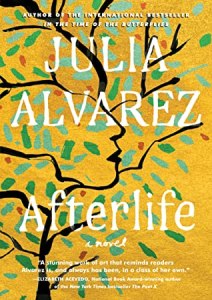 Afterlife by Julia Alvarez
Afterlife by Julia Alvarez
Algonquin, April 2020. 256 pg.
Antonia is a recently widowed, retired English teacher who lives in Vermont. One night she arrives home to find an undocumented pregnant teenager on her doorstep. Then, her sister, who suffers with Bipolar disorder, goes missing. “You’re the most American of us, her sisters have commented to Antonia in an accusatory tone. Just saying, they said smugly when she asked what was wrong with being whoever she was. Admittedly, she was the worrier, the insomniac, the most anxious and disciplined of the sisters.” Through gorgeous prose and astute observations, Julia Avarez examines a woman’s struggles to maintain her individual identity as well as to navigate relationships with her three sisters and her immigrant community.
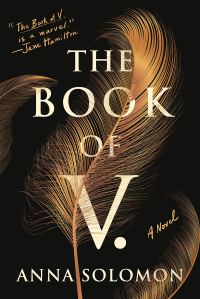 The Book of V by Anna Solomon
The Book of V by Anna Solomon
Henry Holt & Company, May 2020, 320 pg.
I gasped excitedly when I walked into the break room at my bookstore job and saw the ARC of this novel. I tore through this book in two days. Leaving Lucy Pear is one of my favorite novels and now after reading this I’ll count Anna Solomon as a favorite author. This novel focuses on three Jewish women– Lily is a mother, second wife and writer in 2016. Vivian is a political wife during the Watergate-era. Esther is an independent woman in ancient Persia. They’re all strong, independent-minded women. and Solomon fully explores each character’s motivations, desires, needs, struggles, commonalities and connections across the centuries.
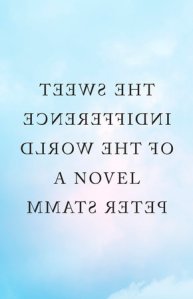 The Sweet Indifference of the World by Peter Stamm
The Sweet Indifference of the World by Peter Stamm
Other Press, January 2020. 160 pg.
I only read one book by a white male author and this is it. I have a handful of favorite cis white male authors and Peter Stamm counts as one of them. I read them immediately. I appreciate his gorgeous, melancholy writing. This one is short and interesting– a writer, Christoph, meets a woman, Lena, who is the doppelganger of his former lover, Magdalena, who inspired his first novel post breakup. Lena recognizes her own relationship with a writer named Chris in the story she’s told. This one blurs past and present, fiction and reality. How much does reality influence fiction and fiction influence reality? He comments: “With youthful pathos, I had believed I had to decide between her and my writing, between freedom and love. Only now did I understand that love and freedom were not mutually exclusive, but mutually entailed: the one wasn’t possible without the other.”
BOOK REVIEW: Perfect Tunes
Posted by Amy Steele in Books on November 23, 2020
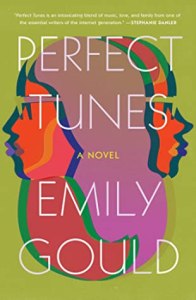 Perfect Tunes by Emily Gould. Avid Reader Press| April 2020| 272 pages| $26.00| ISBN: 978-1-5011-9749-9
Perfect Tunes by Emily Gould. Avid Reader Press| April 2020| 272 pages| $26.00| ISBN: 978-1-5011-9749-9
RATING: 3.5 /5*
Laura, an aspiring singer/songwriter from Ohio, moves to New York to share an apartment with Callie, her best friend from high school. Despite her plans to avoid dating, Laura ends up falling in love with the bass player in an up-and-coming band. Turns out she’s more into him than he is with her: “Laura fought back the urge, again, to tell him that she loved him, to claim him officially somehow. The thought of him with random girls in different cities made her want to peel off her skin. She wished that they were married. She wanted everyone he met to know they were together. There was no possible way to express any of this to him.” It turns out that Laura wants to be independent and successful on her own merits but also wants to be in a relationship. Which, of course, is possible. It just isn’t possible with this guy. She’s a people pleaser and I almost cringed at the part where she’s over there cooking dinner for Dylan and his roommate/bandmate. I had a crush on a guy in a band one time and would walk his dog for him several times a week thinking that would make him more interested in me. Foolishness that I can’t say I didn’t repeat.
Dylan enjoys the attention and frenetic lifestyle associated with being in a band and touring. Laura and Callie form a band that opens for Dylan’s band and has some potential due to Laura’s songwriting prowess. Dylan’s a troubled soul struggling with a mood disorder and addiction. Sadly relatable: “He was swaying and slurring as he said this. Laura understood, without wanting to, that Dylan was much more interested in getting fucked up than he was in having sex with her.” The short-lived romance ends in tragedy and a life-changing pregnancy for Laura. She ultimately chooses her daughter over her career and her friend Callie ends up with a successful music career; maybe the one that Laura initially wanted.
Divided into three parts, the novel focuses on Laura’s early years in New York, Laura being a young mother and then on Laura’s teenage daughter Marie and her desire to learn about her biological father. As I’ve worked in the music business and have followed bands and dated musicians and experienced unrequited love (too often), I could completely relate to Laura’s early experiences in New York. I lost a bit of interest in the motherhood part. I wanted more details and focus on Laura’s songwriting. The title suggested as much and I expected more. Despite its pivot from singer/songwriter to motherhood, it’s a mostly enjoyable, quick read. Although I was disappointed, I still kept reading which attests to Emily Gould’s writing talents. I’ll try another one of her novels.
book review: With or Without You
Posted by Amy Steele in Books on August 19, 2020
With or Without You by Caroline Leavitt. Algonquin| August 4, 2020| 288 pages | $26.95| ISBN: 9781616207793
RATING: ****/5*
The way you expect your life to be isn’t often the way it ends up being. Societal pressures and outside influences affect decision-making. People change over time and sometimes love relationships don’t work anymore or just don’t fit. Why do some people languish in relationships that aren’t particularly satisfying anymore? When do you just let go of a relationship, even if you’ve been in it for a substantial amount of time?
Stella and Simon, both 42, live in New York, have been together for 20 years and don’t have any children. An RN, Stella wants a stability and a family. Simon, a musician, still dreams of success and fame in the music industry. Stella and Simon have different personalities and demeanors. Stella is strong, independent, organized, goal-oriented. Simon is laid back and not super responsible. He lives the musician lifestyle— he’s laid back and frequently takes drugs.
“She had given up things for him before. After their first year together, she’d left her job as an RN because it was so exciting to travel with him. And then being on the road got old, or maybe just she did. But by the end of her second year touring with him, she began to feel the need to be a nurse again. It was like a physical pull. She missed having a community of doctors, nurses, and staff that she saw every day.”
It had almost been out of character for Stella to fall in love with Simon— “He came over to see her the next night, and the next, and suddenly there she was, responsible Stella with both feet firmly planted, Stella who never missed a shift, who read books and adored classical music, falling heedlessly for a rocker with an impulsive lifestyle and a way with words, simply because he cared so much about her, Iike no one ever had before.”
As someone who has tried to make relationships work with people who don’t have the same values as me or who don’t have a compatible personality or aren’t going to learn and grow over the years, I found myself deeply connected with this novel. As a music journalist I’ve had many encounters with musicians. I understand the charisma and the draw involved. Someone you might not look at on the street becomes 10x more attractive on stage playing an instrument and/or singing. As a middle-aged woman, I completely comprehend wondering how time flew by and why aren’t I more fulfilled in my life?
On the eve of the start a tour that he hopes will catapult his stagnant music career, Simon convinces Stella to take drugs with him and she falls into a coma for two months. Simon can’t make it out on tour and his band mates find a replacement. He doesn’t know what to do with himself now that he’s no longer in a band. The coma completely transforms Stella. She’s now an artist with a remarkable ability to draw portraits in which she’s able to capture a person’s innermost desires and feelings. While Stella was in the coma, Simon got close to Stella’s best friend. Do Stella and Simon choose loyalty or independence?
At turns melancholy, amusing, relatable and infuriating, With or Without You is a thoughtful novel about choices, identity, self-worth in relationships and careers and remaining true to yourself. It’s about questioning everything that makes you happy and what you should do vs. what truly fulfills you. It’s a complex and unique read.
book review: Good Riddance
Posted by Amy Steele in Books on February 4, 2019
 Good Riddance by Elinor Lipman. Houghton Mifflin Harcourt| February 5, 2019| 304 pages | $25.00| ISBN: 978-0-544-80825-6
Good Riddance by Elinor Lipman. Houghton Mifflin Harcourt| February 5, 2019| 304 pages | $25.00| ISBN: 978-0-544-80825-6
RATING: 4.5/5*
–review by Amy Steele
“I used to have a husband, from a marriage that was a bad idea from the start. Now I can advise others: Never marry a man who proposes too early.”
When Daphne discards her deceased mother’s yearbook, a neighbor decides she’s going to make a documentary about what she discovers in it. One person’s trash is another’s treasure, particularly an enterprising someone looking to advance her career. Daphne’s mother, June, was a teacher and yearbook advisor for the Class of 1968 who attended every class reunion and kept detailed notes about the students in the yearbook. Seemingly everyone had a crush on Daphne’s mother at this New Hampshire high school. June had an affair with a student after he graduated. Daphne attends a reunion as a fact-finding mission and this man, now a state representative, claims to be Daphne’s biological father. Daphne introduces herself to her tablemates in this manner: “I was bamboozled into a loveless marriage because my husband wouldn’t inherit his grandparents’ money while he was still single.” Daphne hasn’t had the best of luck in relationships. She’s self-deprecating and aware of her challenges and somewhat resigned. She’s completely surprised when she embarks on a tryst with her cute younger neighbor, an actor. She ends up having lots of fun and confides in him. It’s just the ego boost she needs. I found Daphne to be quite genuine and relatable. Her father seems like a great dad. The news that someone else might be her biological father, leads Daphne to have bouts of doubt: “My not sleeping great had to do with the ugly breaking news that my entire existence was based on a lie. Shouldn’t I have been warned of inheritable diseases that might be down the road? Or told to work harder in high school because I could apply as a legacy to Dartmouth? Such were the 2 a.m. agitations of a dispossessed daughter.” Will these new discoveries affect Daphne’s relationship with the only father she’s ever known? Between studying online to become a pastry chef, hooking up with her neighbor and helping her father navigate his recent move to New York, Daphne attempts to thwart her plans to expose her mother’s personal life. Author Elinor Lipman (The Inn at Lake Divine, On Turpentine Lane) successfully contrasts the idiosyncrasies of small town New England with sprawling Manhattan. Lipman is a master of clever, amusing novels with quirky central characters. Her novels are guaranteed delightful fun reading. I love her writing and creativity so much that I received an advanced copy in October and devoured it right away. It’s the ideal anti-Valentine’s read.
FTC Disclosure: I received this book for review from Houghton Mifflin Harcourt.
book review: My Year of Rest and Relaxation
Posted by Amy Steele in Books on August 6, 2018
 My Year of Rest and Relaxation by Ottessa Moshfegh. Penguin Press| July 2018| 289 pages | $26.00| ISBN: 978-0-525-52211-9
My Year of Rest and Relaxation by Ottessa Moshfegh. Penguin Press| July 2018| 289 pages | $26.00| ISBN: 978-0-525-52211-9
RATING: *****/5*
–review by Amy Steele
“Oh, sleep, nothing else would ever bring me such pleasure, such freedom, the power to feel and move and think and imagine, safe from the miseries of my waking consciousness.”
Before I discovered yoga and meditation I would often isolate from the world by downing a bunch of pills. After a bad break-up, I spent three weeks consuming solely Diet Coke and Klonipin. Not advisable but I wanted to shut everything out as quickly as possible and for as long as possible. It was inherently easier to sleep through the misery in hopes I’d eventually feel better. It wasn’t the best coping mechanism. In case anyone’s wondering, I no longer drink soda and rarely rely on Klonipin. I still have terrible agoraphobia and anxiety but numbing myself isn’t going to fix that and there are much more productive uses of my time.
Everything appealed to me about the novel My Year of Rest and Relaxation, from the title to the cover—a portrait of a sullen Victorian woman—to the description to this sentence in the opening paragraph: “I’d get two large coffees with cream and six sugars each, chug the first one in the elevator on the way back up to my apartment, then sip the second one slowly while I watched movies and ate animal crackers and took trazodone and Ambien and Nembutal until I feel asleep again.”
The novel focuses on a 24-year-old Columbia University graduate in the year 2000 in New York City and her intention to essentially hibernate through the year with pharmaceutical assistance. She’s recently lost her art gallery job. Her parents died while she was in school. Her on-again-off-again relationship with a guy who works on Wall Street doesn’t satisfy. So what’s so bad that she needs to shut out the world. She explains: “I can’t point to any one event that resulted in my decision to go into hibernation. Initially I just wanted some downers to drown out my thoughts and judgments, since the constant barrage made it hard not to hate everyone and everything, I thought life would be more tolerable if my brain were slower to condemn the world around me.”
She lives in an inherited apartment with few financial concerns. Her friend Reva, who she met in college, stops in once a week for a wellness check. Of Reva: “I don’t know what it was about Reva. I couldn’t get rid of her. She worshipped me, but she also hated me. She saw my struggle with misery as a cruel parody of her own misfortunes. I had chosen my solitude and purposelessness, and Reva had, despite her hard work, simply failed to get what she wanted—no husband, no children, no fabulous career.” She spends any waking hours watching movies, particularly those starring Whoopi Goldberg and Harrison Ford. She also finds questionable psychiatrist who unwittingly assists her sleep plans by prescribing an arsenal of drugs.
“I went to the bathroom and took stock of the medicine cabinet, counting all my pills on the grimy tile floor. In all, I had two Ambien but thirty more on the way, twelve Rozerem, sixteen trazodone, around ten each of Ativan, Xanax, and Valium, Nembutal, and Solfoton, plus single digit amounts of a dozen random medications that Dr. Tuttle had prescribed only once…”
One might wonder how an entire novel could revolve around this subject. Author Ottessa Moshfegh delves into the narrator’s past—her previous relationships, her family, her relationship with Reva, as well as her aspirations as an artist. About her parents: “And I’d feel sorry for myself, not because I missed my parents, but because there was nothing they could have given me if they’d lived. They weren’t my friends. They didn’t comfort me or give me good advice. They weren’t people I wanted to talk to. They barely even knew me.”
Dark humor, a self-deprecating tone and astute details and brilliant writing makes this novel work so well. There are strong Sylvia Plath vibes throughout. If you’ve dealt with mental illness, a major loss or being an outcast then you’ll likely appreciate this character. I found her to be immensely relatable. It’s a complicated, challenging world and some of us find solace in darkness.
FTC Disclosure: I received this book for review from Penguin Press.
STEELE INTERVIEWS: Joanna Luloff
Posted by Amy Steele in Books, Interview on July 16, 2018

While on assignment in India, Clare, an international journalist, becomes stricken by an illness which destroys her memory. Once back in the states she’s forced to rely on her husband Charlie and her best friend Rachel to reconstruct the past and her memories. Does she remember specifics of her marriage and her friendship, the things that sustain these relationships? Claire senses that something isn’t right but doesn’t know if it’s her marriage or her friendship or a combination. Can she even trust Charlie and Rachel. The novel is effectively told in different points of view and jumps back and forth from present to past and back again.
I spoke with author Joanna Luloff by phone earlier this month.

Amy Steele: Where did you get the idea for this novel?
Joanna Luloff: My mom and I talked about her memory loss and how she had to borrow other people’s memories. A lot of years later when I was actually in graduate school, we started to have this correspondence where I would send her a photograph and I’d ask her what she saw in it and she’d do the same for me. I also did an experimental project for a class that I was taking.
I became more interested in the people surrounding someone with memory loss and how it affects them. To lose the confirmation from other people. The story got shifted away from just a person with memory loss to those people surrounding that person and it started to shift away from my family into fictional characters and what it meant to gradually recover their love for each other and the secrets and all this conflict.
Amy Steele: A lot of times you want to let things go from the past and live in the present but obviously there are certain connections which affect how you’re fitting in with certain people.
Joanna Luloff: The idea that memory is very subjective anyway. We frame the story as we remember it. My brother and I have very different recollections of the same event. As a fiction writer, I love to elaborate and add to the story. I know my stories are often changed through imagination.
Sometimes I think you can rewrite and event or create the situation you’d want to have or rework a situation/ investigate it.
Amy Steele: Did you prefer writing a certain character?
Joanna Luloff: I probably had the easiest time writing Rachel’s character because she gets to be an observer and be on neutral ground but she also has her own secrets. She sees so much so it was fun. And Charlie might have been the hardest because he’s a man from England. I lived in England for a really short time and I was really struck by the reserved politeness and stoicism. I tried to channel a bit of that restraint which British men seem to have.
Amy Steele: Do you think writing his character was the greatest challenge in the overall writing of the novel?
Joanna Luloff: I think the biggest challenge I had was not about character or voice but the structure. I needed to figure out the story’s chronology. For Claire, obviously her memories were super jumbled and the characters are constantly moving from the present to the past. My first drafts of the novel were disjointed.
Amy Steele: I was skeptical of everyone involved. How do you organize? How long did it take you to write the novel?
Joanna Luloff: It didn’t take me a long time to write the first draft. I was at least able to knock out the basic foundation of the book. It was a lot of revisions and layering in the mystery or base suspicion of what the truth might be.
I wrote it out longhand and it worked out well because I was able to rip out pages and lay them out on the floor and play around with what needed to go where and I think it helped to be able to see it in different forms. Once that was in place then I did some adding and subtracting where I thought there needed to be more questioning of the character. I was able to play a bit more with how much the characters were withholding from each other, why they were doing that, all the secrecies and the past injuries to layer in eventually.
Joanna Luloff received her MFA from Emerson College and her PhD from University of Missouri. She teaches at the University of Colorado.
She’ll be appearing at Harvard Book Store on Monday, July 16, 2018.
book review: Little Fires Everywhere
Posted by Amy Steele in Books on September 15, 2017
 Little Fires Everywhere by Celeste Ng. Penguin Press| September 12, 2017| 384 pages| $27.00| ISBN: 978-0-7352-2429-2
Little Fires Everywhere by Celeste Ng. Penguin Press| September 12, 2017| 384 pages| $27.00| ISBN: 978-0-7352-2429-2
RATING: ****/5*
“She had, in short, done everything right and she had built a good life, the kind of life she wanted, the kind of life everyone wanted. Now here was this Mia, a completely different kind of woman leading a completely different life, who seemed to make her own rules with no apologies.”
What can I say about a novel that’s already garnered immense praise? Reese Witherspoon chose Little Fires Everywhere for her book club and plans to turn it into a miniseries. I adored Celeste Ng’s exquisite debut novel Everything I Never Told You. An immensely talented writer, Celeste Ng addresses race, class, youth, perception, expectations and family dynamics through gorgeous, thoughtful and tender writing.
At the outset of the novel, there’s a colossal fire and the why, who and how slowly unwinds throughout the novel. We start with the preppy picture-perfect Richardson family. Mr. Richardson is an attorney, Mrs. Richardson is a freelance reporter for the local newspaper. She grew up in Shaker Heights and convinced her husband to move back to the community to raise a family. The couple has four teenage children: Izzy, Moody, Lexie and Trip. Izzy’s the unpredictable one, Moody [aptly named] is the sensitive and cerebral one, Lexie is pretty and smart and popular one and Trip is the athletic one. I’d not heard of the idyllic Shaker Heights community –sounds like a gated community with its rules and regulations and standards–and this novel definitely provided me with a detailed visual. Growing up, I didn’t live in a neighborhood and at high school reunions always feel a bit excluded [not the only way that happens] when people connect through whatever neighborhood they resided in.
A single artist mother, Mia, and her daughter, Pearl, become tenants in a two-family home owned by the Richardsons, the disparate siblings develop connections with either mother or daughter or both. An itinerant pair, seemingly due to Mia’s artistic temperament, Mia promises her daughter Pearl that they’ll stay in Shaker Heights for a while. How difficult for a girl to have to constantly move about. There’s a romanticism to an artistic life but it’s the mother’s choice and not the daughter’s and understandable that she’d be attracted to the Richardson family’s stability and prosperity. Ng writes: “They knew important people, the Richardsons: the mayor, the director of the Cleveland Clinic, the owner of the Indians. They had season tickets at Jacobs Field and the Gund.” In comparison: “Mia and Pearl got as much as they could used—or better yet, free. In just a few weeks, they’d learned the location of every Salvation Army store, St. Vincent de Paul’s, and Goodwill in the greater Cleveland area.” There’s a moment where Lexie lends Pearl one of her tops and Pearl seems to be stepping into Lexie’s body and into the family by wearing the garment.
To supplement her inconsistent income from art sales, Mia finds part-time work at a local Chinese restaurant and with Mrs. Richardson’s encouragement starts cleaning and preparing meals for the Richardson family. By then Pearl and Moody have become close and Pearl hangs out to watch television at their house after school. In the same classes, Moody and Pearl develop a close friendship while she develops a crush on Trip, a junior and a jock, and longs to be more like Lexie. A fascinated Izzy soon begins work as Mia’s art assistant. Lexie confides in Mia in a way she’d never confide in her own mother. Quite understandable as these are moody teenagers striving to both fit in, express themselves and figure out who they want to be. Most everyone sacrifices something in their path to adulthood or to career success or family desires
When one of Elena Richardson’s oldest friends attempts to adopt a Chinese-American baby, it drives a wedge between Elena and Mia and finds their children questioning what’s fair. At that point, Pearl and Trip and Lexie and her boyfriend Brian are all sexually active. There’s a pregnancy scare to align with the adoption efforts. This is a lovely description of Pearl from Trip’s perspective: “Pearl was smarter than any of them and yet she seemed comfortable with everything she didn’t know: she lingered comfortably in the gray spaces.” Pearl possesses the wisdom of a girl who’s had to adapt to varied settings and too often make her place as the new girl. She’s adept at adapting. She’s observant and feeling. And now she’s feeling safe and comfortable. Elena starts to delve into Mia’s past and doing so will dramatically change her children’s lives forever.
Throughout the novel, Ng deftly takes the reader inside these family’s homes and into the depths of her characters’ minds and hearts. How can you separate your goals from those of others around you? What do you need to do to find yourself and to be satisfied with that? If fitting in means you have to give up your dreams will you ever be truly content? Several times as a plot twist clicked, I had to stop a moment to admire Ng’s cleverness. This is a must-read– a wonderful, graceful and moving novel.
–review by Amy Steele
FTC Disclosure: I received this book for review from Penguin Press.
book review: Before Everything
Posted by Amy Steele in Books on August 3, 2017
 Before Everything by Victoria Redel. Viking| June 2017| 288 pages | $26.00| ISBN: 9780735222571
Before Everything by Victoria Redel. Viking| June 2017| 288 pages | $26.00| ISBN: 9780735222571
RATING: ***/5*
In hospice for cancer, Anna’s old childhood friends gather at her house. Before Everything moves from present to past to provide the reader with details about each woman’s connection to Anna. Comfort, support and nostalgia connect this group of friends. Each woman has a specific relationship with Anna and with each other and then as a group. There’s the group think and then the individual’s thoughts. Whenever the novel veered into the precious and perfect I lost interest. Lovely crisp writing kept me reading. Author Victoria Redel powerfully chronicles Anna’s battle with cancer and hospice care and dying. This aspect of the novel interested me most. On fear of dying: “That was what Helen had never asked, what over all these years of treatment and periods of health Helen and The Old Friends have trained themselves not to ask. It was a tacit agreement. The answer was too obvious; it loomed in each moment’s specific worry.”
Despite caring so much there’s still a level of competition between the friends: “But Helen knows the answer. She’s known it since she arrived two weeks ago and began her adamant petition to pull Anna from hospice. She knew it back at the pond when she agreed to help Anna if Anna asked. Helen’s job all these years was to keep Anna away from fear and close to the yes. But Anna is not afraid. Again, Anna is doing something before Helen. It has always been this way. Boys. Drugs. Marriage. Children. Even the pregnancy that Anna ended. Over and over. Anna went first. Now this.”
I appreciated the realistic description of outsider views of these old friends: “He was glad for her yelp. Any dose of dark humor was better than all the treacly concern he heard from her visitors.” A newer friend thought: “The Old Friends. Whatever they called themselves, there was always a pecking order. Pretty pathetic considering the circumstance.” When my friend’s mom fought cancer, some of her friends kind of pushed my mom away when my mom wanted to help. I can’t imagine still being so connected to childhood friends. At every phase of my life I’ve lost friends and made new friends. I maintained friendships with high school friends into college and some college friends post-college and sure I am still connected to some high school and college friends via Facebook but if I really needed someone would these friends be there for me? The novel started strong and petered out toward the end. It seemed too much, these women and their near perfect lives and near perfect friendships. At the last high school reunion I attended a friend said that it was impossible to know what other classmates had endured despite outward appearances to the contrary. I get it. Unfortunately, I lost a connection to the various characters.
FTC Disclosure: I received this book for review from Viking.
book review: The Nakano Thrift Shop
Posted by Amy Steele in Books on July 20, 2017

The Nakano Thrift Shop by Hiromi Kawakami. Europa Editions| June 2017| 240 pages | $16.00| ISBN: 978-160-945-399-2
RATING: ****/5*
“Takeo arrived, again smelling of soap. For a moment, I wondered if I ought to have taken a shower, but I quickly pushed that thought aside, since had I done so, he might have thought I was expecting something. This was what made love so difficult. Or rather, the difficult thing was first determining whether or not was what I wanted.”
Such a gem of a novel. Author Hiromi Kawakami brings layers and depth to seemingly ordinary, routine lives. Lots of interesting characters plus solid descriptions to create strong setting & sense of place. I appreciated the novel as it allowed me to experience Japan –from the rainy season to love hotels–through these characters. The novel focuses on twenty-something Hitomo who works part-time at the thrift shop. Kawakami writes: “With its second-hand goods (not antiques), Mr. Nakano’s shop was literally filled to overflowing. From Japanese-style dining tables to old electric fans, from air conditioners to tableware, the shop was crammed with the kind of items found in a typical household from the 1960s or later.” Hitomo sort of dates her aloof co-worker Takeo and builds bonds with shop owner Mr. Nakano and his artist sister Masayo. Her relationship with Takeo reminded me of my current on-again/off-again situation. She’s intrigued by Takeo and attracted to him. Does she need to know what kind of relationship she’s going to have with her co-worker? Some people, most of society, feel the need to label something, to put it into a box, cross things off a list. Few people (including Takeo and this guy I was seeing) are willing to allow something to unfold organically and mindfully. You can make plans for the future and have goals but you can also enjoy the moment. Relatable: “We were so different from each other in the first place—it’s not surprising that two people with nothing in common would end up like this, I thought to myself as I threw caution to the wind and continued to steal glances at Takeo’s face.” Also relatable: “When I thought about the idea of spending the rest of my life like this—going through my days I a fog of anxiety and fear—I felt so depressed I could have laid down on the ground and gone to sleep right then and there. But despite all that, I loved Takeo. When I scrutinized love, I still found myself in a world that felt empty.” On her boss Mr. Nakano’s lover: “’The Bank’ was pretty. To call her a beauty might have been going too far, but she had a delicate complexion—she seemed to be wearing hardly any make-up yet her skin was flawless. Her eyes might have been narrow but her nose was straight. There was something inexplicably vibrant about her lips. At the same time, she had purity about her.” Besides beautiful, thoughtful writing, I’m often attracted to the Europa book covers. Look at that cover! Book design credit goes to Emanuele Ragnisco.
–review by Amy Steele
FTC Disclosure: I received this book for review from Europa Editions.
book review: Exit West
Posted by Amy Steele in Books on March 5, 2017

Exit West by Mohsin Hamid. Riverhead Books| March 7, 2017| 231 pages | $26.00| ISBN: 978-0-7352-1217-6
RATING: 4.5/5*
After finishing college, Nadia questions her faith and decides, to her family’s dismay and disdain, to move out on her own– “She secured a room of her own atop the house of a widow, a record player and small collection of vinyl, a circle of acquaintances among the city’s free spirits, and a connection to a discreet and nonjudgmental female gynecologist.” Nadia enjoys her independence as much as possible: she works at an insurance company; smokes pot and does shrooms and maintains connections through social media. She soon meets Saeed and they clandestinely date and slowly fall in love as the country and everything they know crumbles around them. They both work their different jobs during the day and meet at night at cafes and then at Nadia’s apartment. She throws down a black robe for him to put on and enter the apartment without raising suspicions or backlash about a single woman entertaining a male visitor. Slowly the country becomes less safe. Nadia and Saeed lose their jobs. Then it becomes impossible to communicate. Author Mohsin Hamid writes: “But one day the signal to every mobile phone in the city simply vanished, turned off as if by flipping a switch. An announcement of the government’s decision was made over television and radio, a temporary antiterrorism measure, it was said, but with no end date given. Internet connectivity was suspended as well.” Nadia and Saeed decide to escape the country as refugees.
First they land at a refugee camp in Mykonos —“It was said in those days that the passage was both like dying and like being born, and indeed Nadia experienced a kind of extinguishing as she entered the blackness and a gasping struggle as she fought to exit it, and she felt cold and bruised and damp as she lay on the floor of the room at the other side, trembling and too spent at first to stand, and she thought, while she strained to fill her lungs, that this dampness must be her own sweat.” They then move on to London –“It was here that Saeed and Nadia found themselves in those warmer months, in one of the worker camps, laboring away. In exchange for their labor in clearing terrain and building infrastructure and assembling dwellings from prefabricated blocks, migrants were promised forty meters and a pipe: a home on forty square meters of land and a connection to all the utilities of modernity.” They finally end up in Marin, California– “Saeed made it a point to smile with Nadia, at least sometimes, and he hoped she would feel something warm and caring when he smiled, but what she felt was sorrow and the sense that they were better than this, and that together they had to find a way out.”
The couple drifts apart despite their best attempts to stay together. It’s an attempt to keep something familiar nearby, to keep their country in their hearts. They adapted to their new country and living situations in varied ways—Nadia relishes the personal freedom while Saeed becomes focused on religion– which makes their relationship untenable and unsustainable. A beautiful, thoughtful, intelligent novel about refugees that couldn’t be timelier. Using mystical realism, Hamid tells a potent and poetic story of love and freedom in this short novel. Lovely reflections on connectivity and choice and circumstances. Hamid beautifully contemplates very human desires to achieve, to thrive, and to share oneself in order to make sense of an often nonsensical, violent and cruel world. It’s absolutely essential reading.
–review by Amy Steele
Mohsin Hamid will be reading at Harvard Book Store on Wednesday, March 8 at 7pm.
FTC Disclosure: I received this book for review from Penguin Random House.
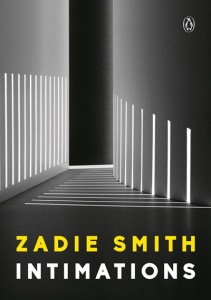

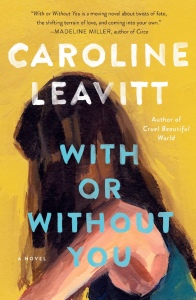








You must be logged in to post a comment.